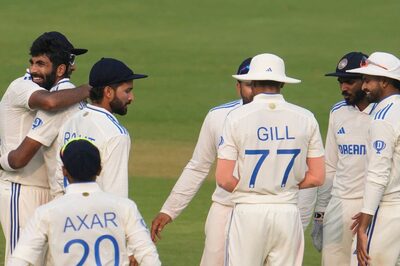
views
Should law makers have any business to tell us what we should eat? India is gradually being looked at as an intolerant nation, making world headlines for all the wrong reasons and the word 'ban' is the keyword. I begin this saying that I am a Hindu who does not eat beef and respects the religious sentiments of my community. But I am absolutely fine with going with a friend who eats beef. As some rightly say "The problem also lies in between the link the eating of beef or at least, tolerating the eating of beef" and that says all.
Dr Ambedkar's insistence that cow protection was included in the chapter on the Directive Principle of State Policy, and not as a Fundamental Right. This expression in Article which states, "The State shall endeavour to organise agriculture and animal husbandry on modern and scientific lines and shall, in particular, take steps for preserving and improving the breeds, and prohibiting the slaughter of cows and other milch and draught cattle." Interestingly, the latest decision has tried to justify that this ban on slaughter of cattle, whether the cow or the bull or the ox, hurts the religious sentiments of Hindus.
Have we not come a long way now? This ban in the 21st century is seen to be as an encroachment on the rights of the citizens to decide what to eat and what not to. For many Dalits this is a form of 'untouchability' where their choices are not kept under consideration.
The BJP ruled India is also the third largest exporter of beef and it is yet to be seen if the party is considering a countrywide ban. After the Maharashtra and Haryana ban came into place, party's chief minister in Goa clarified the same ban cannot be imposed on Goa's people - especially Christians eating beef is part of their food. It is also important to note that beef ban or a law on cow slaughter was not a part of the manifestoes of the party in 2014 for West Bengal, Kerala (where many Hindus too consume beef) and Jammu and Kashmir (a state where pork as it is forbidden in Islam). Does that mean it is it being done for sentiments and sensitivities or is it mere vote bank politics? Did this ban not add a communal tinge? It adds to the woes of minorities who are already feeling isolated after attack on churches and programmes including Ghar wapasi etc.
For thousands it is not about their favourite meat missing from the dining table, the ban has now had as some reports suggest serious economic ramifications as well. Thousands of Indians are employed in the slaughter trade and the leather industry would be unemployed.
We are a secular nation (shall continue to be one) where almost half the population eats beef, though most of the Hindus abstain. Some Hindus do eat beef, as well as Dalits (16.6% of the population), Muslims (14.88%), Christians (2.3%) and Sikhs (1.9% - Beef eating is forbidden in Sikhism) - although, the 'religion' figures are from the 2011 census still haven't been published. Many say the numbers have increased significantly.
It is a sense of undeserved humiliation for Muslims, Dalits and Christians, especially those who are also economically backward and look at beef as affordable source of protein. This should actually not be seen from a religious angle alone, as the ban has led to hike in prices of other meat, which means that India's poor - like many Dalits will be unable to afford meat. And for most it has become a matter of their respect, they feel at stake is the dignity and they feel the government has easily ignored that they even exist.
I have friends (and many colleagues) from Kerala who are Hindus and have families of generations who eat beef and tell me almost all Hindus in Kerala eat beef (specify their favourite is beef fry - A Kerala delicacy).
If we talk about the north-east people in Meghalaya, Mizoram, Nagaland eat beef too. And that pulls my imagination to unseen destinations (which I am completely unaware of), where cultures fuse and people have pleasurable fantasies about their food and not as much their beliefs. A lot of food mutation happened due to British invasion of India and Anglo Indians. British followed much of their traditions - culinary, sartorial and cultural. Even the Badshahs, Nizams and Mughals had their own delicacies that left an impact on eating habbits in Delhi, Lucknow and Hyderabad and many other areas in the country. Biryani in Hyderabad is such an ingrained notion, that some Hindus in Hyderabad will eat Biryani to celebrate Diwali, as against other parts of the country that keeps a fast or stays vegetarian on Diwali.
A recent report says that in ancient India, killing and consuming animals was part and parcel of life of all. Hindus then were overwhelmingly non-vegetarian. There are historians who have pointed out that back then Hindus ate beef. Also says, "the very fact that Buddhism, which was born and blossomed in north India circa 200-300 BCE (Before CE), places absolutely no restriction on eating beef shows that back then, there was no restriction on eating beef among the Hindus, which practice Buddhism followed". Many food eating meat practices are not only complex from being adopted from invaders, travelers or due to weather conditions, they have actually become a part of our lives.
As children our grandparents told us the stories of tolerance from Ramayana where Lord Ram, as an exiled prince meeting people from different communities including Guhak and Shabri (From Chandal sect, considered untouchables by upper caste Hindus) eats with them. And hence, flouting the prevailing belief in the purity and pollution of food, by those who consider themselves the 'guardians of Hinduism'. The Chandal sect is still confined to outside of villages, condemned to do the kind of work others will not.
Would it be possible to construct a different history and India with a society where we learn to tolerate or even simply ignore each other's food? There are far greater issues that India is facing that we need to address.
(Anshu Chibber is Planning and Assignment editor of CNN-IBN)


















Comments
0 comment